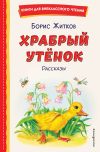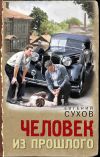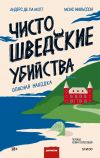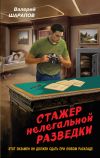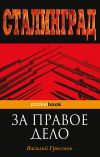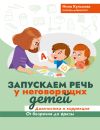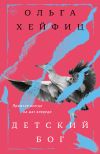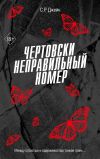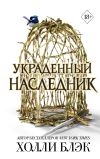Текст книги "Английский с Бретом Гартом. Калифорнийские рассказы / Bret Harte. The Luck of Roaring Camp, and Other Sketches"

Автор книги: Брет Гарт
Жанр: Иностранные языки, Наука и Образование
Возрастные ограничения: +12
сообщить о неприемлемом содержимом
Текущая страница: 7 (всего у книги 12 страниц)
attempt [ǝ'tempt], effort ['efǝt], cravat [krǝ'væt], handkerchief ['hæŋkǝʧi:f], beneath [bɪ'ni:θ], stare [steǝ], vacantly ['veɪkǝntlɪ], hurriedly ['hʌrɪdlɪ]
Yet he did not attempt to fly, and it was only when, with a sudden effort and groan of pain, he half lifted himself above the stockade, that she saw that his leg, bandaged with his cravat and handkerchief, stained a dull red, dragged helplessly beneath him. He stared at her vacantly for a moment, and then looked hurriedly into the wood behind her.
The child was more interested than frightened, and more curious than either (дитя = девочка была больше заинтересована, чем напугана, а более всего – любопытна: «и более любопытна, чем любой из этих двух вариантов»; either – любой один из двух). She had grasped the situation at a glance (она ухватила ситуацию одним быстрым взглядом). It was the hunted and the hunters (это был загнанный /зверь/ и охотники; hunted – загнанный и hunter – охотник от to hunt – охотиться). Suddenly he started and reached for his rifle, which he had apparently set down outside when he climbed into the stockade (вдруг он вздрогнул и потянулся к своей винтовке, которую он, по-видимому, поставил снаружи, когда забирался внутрь частокола; to set down – класть /на землю/ от to set – устанавливать и down – вниз). He had just caught sight of a figure emerging from the wood at a distance (он только что увидел фигуру, появившуюся из леса в некотором отдалении; to catch sight – увидеть: «поймать вид»). But the weapon was out of his reach (но оружие было вне его пределов досягаемости = до него было не дотянуться).
climb [klaɪm], figure ['fɪɡǝ], emerge [ɪ'mɜ:ʤ], weapon ['wepǝn]
The child was more interested than frightened, and more curious than either. She had grasped the situation at a glance. It was the hunted and the hunters. Suddenly he started and reached for his rifle, which he had apparently set down outside when he climbed into the stockade. He had just caught sight of a figure emerging from the wood at a distance. But the weapon was out of his reach.
“Hand me that gun!” he said roughly (подай мне это ружье! – сказал он резко). But Peggy did not stir (но Пегги не пошевелилась). The figure came more plainly and quite unconsciously into full view (фигура вышла более ясно и совершенно неосознанно в полный обзор = человек теперь был совершенно на виду, не понимая этого; to come; plainly – видно, очевидно; full view – полный обзор: «вид»), an easy shot at that distance (легкий выстрел = легкая мишень на этом расстоянии).
stir [stɜ:], unconsciously [ʌn'kɒnʃǝslɪ], full [fʋl]
“Hand me that gun!” he said roughly. But Peggy did not stir. The figure came more plainly and quite unconsciously into full view, an easy shot at that distance.
The man uttered a horrible curse, and turned a threatening face on the child (человек изрыгнул ужасное проклятие и повернул угрожающее лицо к ребенку = девочке). But Peggy had seen something like that in animals she had captured (но Пегги раньше видала что-то вроде этого у животных, /которых/ она поймала). She only said gravely (она лишь сказала серьезно), —
“If you shoot that gun you'll bring 'em all down on you (если ты выстрелишь из этого ружья, ты приведешь их всех «вниз» на тебя = на свою голову; 'em = them)!” “All?” he demanded (всех? – спросил он). “Yes! a dozen folks with guns like yours,” said Peggy (да! дюжину человек с ружьями вроде твоего, – сказала Пегги; folk – народ; folks – разг. мн. ч. люди, парни; родственники, родители). “You just crouch down and lie low (ты просто припади к земле: «вниз» и затаись: «лежи низко»). Don't move (не шевелись)! Watch me (наблюдай за мной).”
curse [kɜ:s], threatening ['θret(ǝ)nɪŋ], demand [dɪ'mɑ:nd], low [lǝʋ]
The man uttered a horrible curse, and turned a threatening face on the child. But Peggy had seen something like that in animals she had captured. She only said gravely, —
“If you shoot that gun you'll bring 'em all down on you!” “All?” he demanded. “Yes! a dozen folks with guns like yours,” said Peggy. “You just crouch down and lie low. Don't move! Watch me.”
The man dropped below the stockade (человек рухнул за частокол; below – внизу). Peggy ran swiftly towards the unsuspecting figure, evidently the leader of the party (Пегги побежала быстро к /ни о чем/ не подозревавшему человеку: «фигуре», видимо, главарю отряда), but deviated slightly to snatch a tiny spray from a white-ash tree (но отклонилась немного /от пути/, чтобы схватить = отломить тоненький прутик от белого = американского ясеня; tiny – крошечный; tree – дерево). She never knew that in that brief interval the wounded man, after a supreme effort, had possessed himself of his weapon (она так никогда и не узнала, что в этот короткий промежуток /времени/ раненый человек, после = ценой величайшего усилия, дотянулся до своего оружия: «наделил себя оружием»; never – никогда, так и не; to know; to possess – владеть, обладать; to possess someone of something – наделять, вручать, давать кому-либо что-либо), and for a moment had covered her with its deadly muzzle (и на секунду взял ее на мушку: «держал ее под прицелом смертельного дула ее = винтовки»; to cover – покрывать; держать под прицелом).
evidently ['evɪdǝntlɪ], tiny ['taɪnɪ], interval ['ɪntǝvǝl], wounded ['wu:ndɪd], supreme [su:'pri:m], possess [pǝ'zes], cover ['kʌvǝ]
The man dropped below the stockade. Peggy ran swiftly towards the unsuspecting figure, evidently the leader of the party, but deviated slightly to snatch a tiny spray from a white-ash tree. She never knew that in that brief interval the wounded man, after a supreme effort, had possessed himself of his weapon, and for a moment had covered her with its deadly muzzle.
She ran on fearlessly until she saw that she had attracted the attention of the leader (она бесстрашно бежала дальше = продолжала бежать, пока не увидела, что привлекла внимание вожака; fearless – бесстрашный от fear – страх; until – пока не), when she stopped and began to wave the white-ash wand before her (когда = после чего она остановилась и начала размахивать ясеневым прутиком перед собой). The leader halted, conferred with someone behind him, who proved to be the deputy sheriff (вожак остановился, посовещался с кем-то позади себя, который оказался помощником шерифа: «оказался быть»; to prove – доказывать; оказываться). Stepping out he advanced towards Peggy, and called sharply (выступив = отделившись от отряда, он пошел к Пегги и выкрикнул резко; to step out – выступать, выходить: «шагать наружу»; to advance – продвигаться вперед), “I told you to get out of this (я сказал тебе убираться отсюда: «из этого»; to get out – выходить, выбираться от to get – зд.: оказаться где-либо и out – наружу, вне)! Come, be quick (давай, поживее: «будь быстрой»; come – давай, ну же: «приди»)!”
halt [hɒlt], confer [kǝn'fɜ:], prove [pru:v]
She ran on fearlessly until she saw that she had attracted the attention of the leader, when she stopped and began to wave the white-ash wand before her. The leader halted, conferred with someone behind him, who proved to be the deputy sheriff. Stepping out he advanced towards Peggy, and called sharply, “I told you to get out of this! Come, be quick!”
“You'd better get out yourself,” said Peggy, waving her ash spray, “and quicker, too (вам бы лучше убраться /отсюда/ самому, – сказала Пегги, размахивая своим ясеневым прутиком, – и побыстрее к тому же: «тоже»; you had better…).” The deputy stopped, staring at the spray (помощник /шерифа/ остановился, уставившись на прутик). “What's up (в чем дело: «что происходящее»)?” “Rattlers («гремучки» = гремучие змеи; rattlesnake – гремучая змея).” “Where (где)?” “Everywhere round you – a regular nest of 'em (везде вокруг вас – самое настоящее гнездо их; regular – регулярный, обычный; разг. настоящий; 'em = them)! That's your way round (вот ваш путь вокруг = обход для вас)!” She pointed to the right, and again began beating the underbrush with her wand (она указала вправо и снова начала колотить по подлеску = кустам и травам своим прутиком; to beat – бить).
wand [wɒnd]
“You'd better get out yourself,” said Peggy, waving her ash spray, “and quicker, too.” The deputy stopped, staring at the spray. “What's up?” “Rattlers.” “Where?” “Everywhere round you – a regular nest of 'em! That's your way round!” She pointed to the right, and again began beating the underbrush with her wand.
The men had, meantime, huddled together in consultation (люди тем временем сгрудились, чтобы посовещаться: «сгрудились в совещании»; to huddle together – собраться, сгрудиться от to huddle – сжиматься, толпиться, съеживаться и together – вместе). It was evident that the story of Peggy and her influence on rattlesnakes was well known, and, in all probability, exaggerated (было очевидно, что история = истории о Пегги и ее влиянии на гремучих змей были хорошо известны и, по всей вероятности, преувеличены). After a pause, the whole party filed off to the right, making a long circuit of the unseen stockade (после некоторой паузы весь отряд: «целый» ушел по одному вправо, делая длинный обход = далеко обходя не видный /им/ частокол; to file off – уйти колонной, по одному от to file – двигаться колонной и off – прочь), and were presently lost in the distance (и вскоре затерялись вдали: «были вскоре затеряны»).
influence ['ɪnflʋǝns], exaggerated [ɪɡ'zæʤǝreɪtɪd], pause [pɔ:z], whole [hǝʋl]
The men had, meantime, huddled together in consultation. It was evident that the story of Peggy and her influence on rattlesnakes was well known, and, in all probability, exaggerated. After a pause, the whole party filed off to the right, making a long circuit of the unseen stockade, and were presently lost in the distance.
Peggy ran back to the fugitive (Пегги побежала назад к беглецу; to run). The fire of savagery and desperation in his eyes had gone out, but had been succeeded by a glazing film of faintness (огонь дикости и отчаяния в его глазах уже потух, но ему на смену пришла остекленевшая пленка слабости; to go out – выходить: «идти наружу»; гаснуть, догорать; to succeed – следовать за чем-либо, приходить на смену). “Can you – get me – some water?” he whispered (ты можешь… раздобыть мне… немного воды? – прошептал он). The stockade was near a spring, – a necessity for the menagerie (частокол был рядом с источником – необходимая вещь: «необходимость» для зверинца). Peggy brought him water in a dipper (Пегги принесла ему воды в ковшике; to bring). She sighed a little (она вздохнула немножко = тихонько); her “butcher bird” – now lost forever – had been the last to drink from it (ее «птица-мясник» = сорокопут – теперь утраченный навсегда – был последним, кто пил из него: «был последним пить»; butcher – мясник; to lose – терять)!
fugitive ['fju:ʤǝtɪv], succeed [sǝk'si:d]
Peggy ran back to the fugitive. The fire of savagery and desperation in his eyes had gone out, but had been succeeded by a glazing film of faintness. “Can you – get me – some water?” he whispered. The stockade was near a spring, – a necessity for the menagerie. Peggy brought him water in a dipper. She sighed a little; her “butcher bird” – now lost forever – had been the last to drink from it!
The water seemed to revive him (вода, казалось, оживила его: «казалась оживить»). “The rattlesnakes scared the cowards,” he said, with an attempt to smile (гремучие змеи напугали этих трусов, – сказал он с попыткой = попытавшись улыбнуться). “Were there many rattlers (много было гремучек)?” “There wasn't any,” said Peggy, a little spitefully (не было ни одной: «никаких», – сказала Пегги немного сердито: «злобно»), “'cept you – a two-legged rattler (кроме тебя – двуногой гремучки; 'cept = except – кроме; two-legged – двуногий от two legs – две ноги)!” The rascal grinned at the compliment (негодяй ухмыльнулся /в ответ/ на этот комплимент; rascal – негодяй; негодник /в том числе с нежностью/). “One-legged, you mean,” he said, indicating his helpless limb (ты хочешь сказать, одноногой, – сказал он, указывая на свою беспомощную конечность; to mean – иметь в виду, хотеть сказать, подразумевать; значить, означать).
coward [kaʋǝd], compliment ['kɒmplɪmǝnt], two-legged [,tu:'leɡ(ɪ)d], limb [lɪm]
The water seemed to revive him. “The rattlesnakes scared the cowards,” he said, with an attempt to smile. “Were there many rattlers?” “There wasn't any,” said Peggy, a little spitefully, “'cept you – a two-legged rattler!” The rascal grinned at the compliment. “One-legged, you mean,” he said, indicating his helpless limb.
Peggy's heart relented slightly (сердце Пегги слегка смягчилось). “What you goin' to do now?” she said (что ты собираешься делать теперь? – сказала она; What are you going to do now). “You can't stay on there, you know (ты не можешь оставаться /и/ дальше там, знаешь ли; on – зд.: дальше). It belongs to me (это принадлежит мне)!” She was generous, but practical (она была великодушна, но практична). “Were those things I fired out yours (а эти зверюшки, которых я выгнал, были твои; thing – вещь, существо; to fire out – разг. выгонять от to fire – палить; гнать, увольнять и out – наружу)?” “Yes (да).” “Mighty rough of me (очень = как бесцеремонно с моей стороны: «от меня»; mighty – могущественный, сильный; простореч. очень).” Peggy was slightly softened (Пегги была немного смягчена = смягчилась).
relent [rɪ'lent], rough [rʌf], soften ['sɒfn]
Peggy's heart relented slightly. “What you goin' to do now?” she said. “You can't stay on there, you know. It belongs to me!” She was generous, but practical. “Were those things I fired out yours?” “Yes.” “Mighty rough of me.” Peggy was slightly softened.
“Can you walk (ты можешь идти)?” “No (нет).” “Can you crawl (ты можешь ползти)?” “Not as far as a rattler (не так далеко, как гремучка).” “As far as that clearin' (так далеко, как до той полянки = доползешь до той полянки)?” “Yes (да).” “There's a hoss tethered out in that clearin' (вон там, на той полянке, привязан мерин; out – вне; зд.: вон там; to tether – привязывать животное). I can shift him to this end (я могу передвинуть его к этому краю).” “You're white all through,” said the man gravely (ты белая = порядочная вся насквозь, – сказал человек серьезно; white – белый, устар. разг.: приличный, благородный).
tether ['teðǝ]
“Can you walk?” “No.” “Can you crawl?” “Not as far as a rattler.” “As far as that clearin'?” “Yes.” “There's a hoss tethered out in that clearin'. I can shift him to this end.” “You're white all through,” said the man gravely.
Peggy ran off to the clearing (Пегги убежала на полянку: «убежала прочь»). The horse belonged to Sam Bedell, but he had given Peggy permission to ride it whenever she wished (конь принадлежал Сэму Беделлу, но он дал Пегги разрешение ездить на нем, когда она ни пожелает; whenever – когда бы ни). This was equivalent, in Peggy's mind, to a permission to place him where she wished (это было равнозначно, в разуме = голове Пегги, разрешению помещать = отправлять его, куда она пожелает). She consequently led him to a point nearest the stockade, and, thoughtfully, close beside a stump (поэтому она подвела его к точке = месту, ближайшему к частоколу и, предусмотрительно, прямо рядом с пнем; consequently – следовательно; стало быть; to lead – вести; thoughtful – предусмотрительный; задумчивый; close – близко). But this took some time, and when she arrived she found the fugitive already there, very thin and weak, but still smiling (но это заняло: «взяло» какое-то время, и когда она прибыла, /то/ обнаружила беглеца уже там, очень тонкого = худого и слабого, но все еще улыбающегося; to find).
permission [pǝ'mɪʃn], equivalent [ɪ'kwɪvǝlǝnt], consequently ['kɒnsɪkwǝntlɪ]
Peggy ran off to the clearing. The horse belonged to Sam Bedell, but he had given Peggy permission to ride it whenever she wished. This was equivalent, in Peggy's mind, to a permission to place him where she wished. She consequently led him to a point nearest the stockade, and, thoughtfully, close beside a stump. But this took some time, and when she arrived she found the fugitive already there, very thin and weak, but still smiling.
“You can turn him loose when you get through with him (ты можешь отпустить его на свободу, когда закончишь с ним = когда он перестанет быть тебе нужен; to turn loose – отпускать на свободу от to turn – поворачивать, вращать; превращать и loose – непривязанный, свободный; to get through with – покончить с чем-либо от to get – зд.: сделать, устроить; through – через, сквозь и with – с); he'll find his way back,” said Peggy (он найдет дорогу обратно, – сказала Пегги: «свою дорогу»). “Now I must go (теперь я должна идти).”
“You can turn him loose when you get through with him; he'll find his way back,” said Peggy. “Now I must go.”
Without again looking at the man, she ran back to the stockade (не глядя уже: «без /того, чтобы/ снова посмотреть» на этого человека, она побежала назад к частоколу). Then she paused until she heard the sound of hoofs crossing the highway in the opposite direction from which the pursuers had crossed (затем она приостановилась, пока не услышала шум копыт, пересекающих большую дорогу в направлении, противоположном тому, в котором /эту дорогу/ перешли преследователи: «в противоположном направлении от того, в котором перешли преследователи»; until – пока не; to hear; sound – звук; to cross – пересекать, переходить /улицу/, переплывать /реку/ и т. п.), and knew that the fugitive had got away (и узнала = поняла, что беглец улизнул; to know; to get away – убегать, удирать от to get – зд.: оказаться где-либо и away – прочь). Then she took the astonished and still motionless lizard from her pocket, and proceeded to restore the broken coops and cages to the empty stockade (затем она взяла = достала ошеломленную и все еще неподвижную ящерицу из кармана и принялась относить обратно разбитые птичьи клетки и клетки /для зверей/ в пустую частокольную ограду = внутрь; to restore – восстанавливать, реставрировать, чинить; возвращать на прежнее место; to break – ломать).
hear, heard, heard [hɪǝ; hɜ:d; hɜ:d], opposite ['ɒpǝzɪt], pursuer [pǝ'sju:ǝ]
Without again looking at the man, she ran back to the stockade. Then she paused until she heard the sound of hoofs crossing the highway in the opposite direction from which the pursuers had crossed, and knew that the fugitive had got away. Then she took the astonished and still motionless lizard from her pocket, and proceeded to restore the broken coops and cages to the empty stockade.
But she never reconstructed her menagerie nor renewed her collection (но она так и не восстановила свой зверинец и не обновила свою коллекцию; never – никогда; так и не; nor – и не). People said she had tired of her whim, and that really she was getting too old for such things (люди говорили, /что/ она устала от своей причуды и что, в самом деле, она становилась слишком взрослой для таких вещей; to tire – утомлять; редк. уставать; old – старый). Perhaps she was (возможно, она /действительно/ становилась слишком взрослой). But she never got old enough to reveal her story of the last wild animal she had tamed by kindness (но она так и не стала достаточно взрослой, чтобы раскрыть = рассказать свою историю о последнем диком звере, /которого/ она приручила добротой; to get – зд.: становиться; to reveal – раскрывать /тайну/).
reveal [rɪ'vi:l], kindness ['kaɪndnǝs]
But she never reconstructed her menagerie nor renewed her collection. People said she had tired of her whim, and that really she was getting too old for such things. Perhaps she was. But she never got old enough to reveal her story of the last wild animal she had tamed by kindness.
Nor was she quite sure of it herself (да и сама она не была вполне уверена в ней = в правдивости этой истории; nor – и не; sure – уверенный; herself – она сама), until a few years afterwards on Commencement Day at a boarding school at San Jose (до /момента/ несколько лет спустя в день вручения дипломов в школе-интернате в Сан-Хосе; commencement – начало; амер. вручение дипломов; boarding school – школа-интернат: boarding – пансион от board – устар. стол и school – школа), when they pointed out to her one of the most respectable trustees (когда ей указали на одного из самых уважаемых попечителей; to point out – указывать /на/ кого-либо, что-либо, особо отмечать от to point – указывать и out – наружу). But they said he was once a gambler (но они сказали, /что/ он был когда-то игроком), who had shot a man with whom he had quarreled (который застрелил человека, с которым он поссорился; to shoot), and was nearly caught and lynched by a Vigilance Committee (и его чуть не поймал и не линчевал Комитет Бдительности: «был почти пойман… комитетом»; to catch).
commencement [kǝ'mensmǝnt], San Jose [,sænhǝʋ'zeɪ], respectable [rɪ'spektǝbl], trustee [trʌs'ti:], quarrel ['kwɒrǝl], vigilance ['vɪʤɪlǝns], committee [kǝ'mɪtɪ]
Nor was she quite sure of it herself, until a few years afterwards on Commencement Day at a boarding school at San Jose, when they pointed out to her one of the most respectable trustees. But they said he was once a gambler, who had shot a man with whom he had quarreled, and was nearly caught and lynched by a Vigilance Committee.
Правообладателям!
Это произведение, предположительно, находится в статусе 'public domain'. Если это не так и размещение материала нарушает чьи-либо права, то сообщите нам об этом.

















